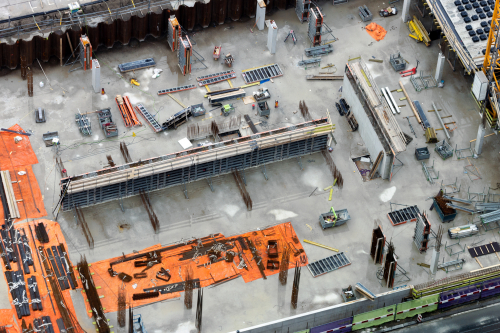Is the Coronavirus Pandemic a Force Majeure?

The coronavirus disease pandemic is an ongoing shock to the U.S. economic system and every-day life. The construction industry is on the front line of the tumult. Earlier this week, Boston Mayor Marty Walsh ordered the stoppage of construction projects within the City of Boston. The City of Cambridge has now followed suit. In other communities, projects have and will see permitting, inspection, and monitoring capabilities diminish in light of directives for public employees to work from home. Worldwide manufacturing slowdowns and stoppages will almost certainly create material supply and delivery issues. How long will it be before many projects in other locales across the country are suspended or completely terminated?
We may be in uncharted waters, but that does not mean that construction industry players (and all commercial parties for that matter) are entirely without legal tools to navigate through the storm. Construction contracts typically contain language dedicated to circumstances beyond the parties’ control that interrupts a project. Likewise, precedent in case law also provides guidance about unforeseen and changed circumstances. This Alert takes a look at some of the legal concepts and practical considerations to keep in mind during these uncertain times.
We have all heard the term “force majeure,” which literally translated means “superior force,” but in practice, encompasses “acts of god,” war, and natural disasters that may result in unforeseeable impacts. The major construction contract forms, published by the American Institute of Architects, the Engineers Joint Contract Documents Committee, and others include force majeure clauses even if that term is not used explicitly. The AIA’s Standard General Conditions (AIA Document A201), for example, handles force majeure this way:
If the Contractor is delayed at any time in the commencement or progress of the Work . . . by labor disputes, fire, unusual delay in deliveries, unavoidable casualties, adverse weather conditions documented in accordance with Section 15.1.6.2, or other causes beyond the Contractor’s control . . . then the Contract Time shall be extended for such reasonable time as the Architect may determine.
Notably, the AIA references few specific causes of unavoidable delay instead of relying on the catch-all “other causes beyond the Contractor’s control.” Whether that includes the current pandemic will depend on the specific facts of any given case, including whether governmental authorities have ordered the cessation of certain commercial activity as has been done in the cities of Boston and Cambridge.
The EJCDC Standard General Conditions (Document C-700) takes a similar approach while using more detailed language:
Where Contractor is prevented from completing any part of the Work within the Contract Times due to delay beyond the control of Contractor, the Contract Times will be extended in an amount equal to the time lost due to such delay if a Claim is made therefor as provided in Paragraph 12.02.A. Delays beyond the control of Contractor shall include, but not be limited to, acts or neglect by Owner, acts or neglect of utility owners or other contractors performing other work as contemplated by Article 7, fires, floods, epidemics, abnormal weather conditions, or acts of God.
Interestingly, the EJCDC specifically references epidemics, which would almost certainly include the Coronavirus pandemic.
The contract language quoted above deals with delay in performance due to a force majeure. Of course, when a construction project is delayed for an extended period of time, contractors and subcontractors can expect to incur increased costs of labor and materials, or to demobilize and then re-mobilize their forces. On large civil projects in particular, mobilization expenses can be significant. Most construction contracts have language that addresses whether and to what degree such expenses are compensable. For example, both the AIA and EJCDC general conditions allow for contractors to recover certain expenses in the event of a suspension. In addition, when a suspension extends beyond a certain prescribed period, many contracts permit the contractor to terminate the contract.
No matter the specific language, both of these commonly used contracts provide for the circumstances that we are facing presently – delay and disruption that is outside of anyone’s control. But, what if your contract does not have this or similar language? In those cases, we would look to the common law for guidance. There are traditional common law doctrines that attempt to balance the obligation to perform with the occurrence of unforeseen events, which render performance “impossible” or “impracticable.” The long-term impact of COVID-19 and the full extent of disruption remains unknown. The line between an excusable delay as a result of the pandemic, and a complete impossibility of performance, will likely be hotly contested in the months and years to come. Courts will need to evaluate to what extent the pandemic altered the circumstances in which performance was to occur. Contractual terms allocating these types of unforeseen risks will vary. In some regions, the issuance of a governmental order halting construction work may be the linchpin for claims of impracticability or impossibility.
Other issues to consider:
- Aside from dramatic circumstances such as the cities of Boston and Cambridge shutting projects down, impacts due to delay, supply chain disruption or subcontractor availability will be more subtle. The cumulative toll of multiple impacts are harder to quantify in real time.
- The contract provisions regarding notice should be a guidepost to action required to document actual impact suffered due to the COVID-19 situation. Make sure you understand when notice is required and what documentation is required to substantiate a claim for a force majeure delay.
- Construction companies, like all businesses, have to consider impacts both to the bottom line, and to the well-being of employees. Considering when and whether to stop work, if you are not ordered to by a local or state authority, is a difficult question. The safety of workers on-site and the availability of unemployment insurance are factors to consider.
- Depending on your specific insurance policy language and exclusions, and the circumstances of a work stoppage or other financial impact, a business impacted by COVID-19 may also be eligible for business interruption coverage. Disputes about whether coronavirus losses are covered by insurance are certain. The scope of insurance coverage will depend on the type of coverage provided, the language included in such policies, and how courts interpret such language in the face of applicable law.
The impact of the coronavirus pandemic will be far reaching. Understanding your rights and liabilities under your existing contracts and insurance policies in light of these impacts is key to charting your course through these troubled waters.
Please do not hesitate to reach out to Verrill’s Construction Law Group for guidance on these or any other issues. You can contact Rob Ruesch or John Giffune.














